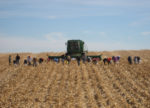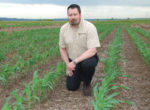Advertise Follow Us
Articles Tagged with ''Corn''
Making ‘Never-Till’ Corn Yields That Are Fit For A King
Cover crops, split nitrogen, fungicide applications and higher organic matter are helping Rigdon Farms make a hard run at 300-bushel corn.
Read More
Tips For Harvesting Downed Corn, And Dealing With The Aftermath
Downed corn can have a significant impact on profits and no-till systems, but here are tips and considerations to make the best of a bad situation.
Read More
25 Years Of Unlocking Secrets To No-Till Success
Since 1988, the Graves-Chapple Research Center has been helping no-tillers in northwestern Missouri fine-tune their corn-and soybean system management and farm their no-tilled acres more sustainably.
Read More








